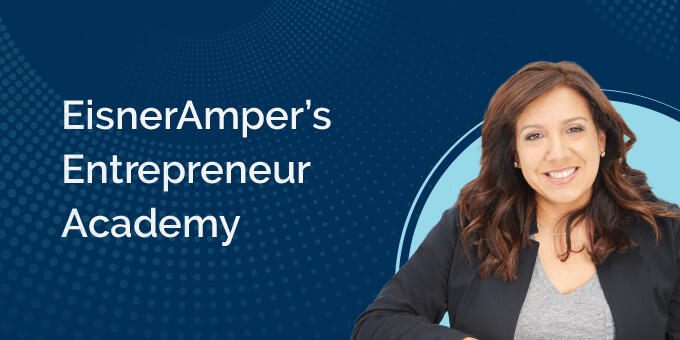Entrepreneur Academy
- Published
- Aug 5, 2022
- Topics
- Share
A 409A valuation is used by private companies to assess the fair market value of their stock. In this video, you’ll learn when a 409A valuation is necessary, the length of time in which it is valid, and which events trigger the need for an update.
Transcript
Michele Epstein:
Let’s first cover the basics to gain an understanding of what a 409A valuation is – they are used by private companies, including early-stage start-ups, to assess the fair market value of their stock. While a public company’s stock value is based on the market, these valuations are used to assess the value for a private company, since how else would a private company know how to value its equity?
IRC Sec. 409A was passed in the 2000s as a result of the Enron scandal – aware of the pending bankruptcy, executives moved $32 million out of deferred compensation accounts for their personal benefit. The new law impacted the deferred compensation plans and the related tax advantages, whereas stock option grants were previously considered as tax-free events. The resolution excluded stock options from the definition of tax-deferred compensation unless certain rules are enforced. For instance, if employees are given stock options at a price equal to the fair market value of the stock, then 409A is not applicable. The 409A valuation falls under a ‘safe harbor’ by hiring a reputable service provider to perform the assessment.
When your company is offering equity or has intentions to, a 409A valuation is needed. These valuations are acceptable for up to 12 months following the effective date, but may need to be updated more frequently if there is a material event. (A material event, like M&A activity or additional sales of common stock, to name a few, would impact the company’s stock price.)
For example, if a biotech company acquires a competitor, a new 409A would be appropriate to assess the new value of the resulting company. Or if a tech startup completes a new round of financing through the issuance of preferred stock, the enterprise value would be adjusted and a new 409A would be appropriate.
It is key to obtain a 409A valuation prior to the issuance of your first common stock options in order to support the value of the stock that you are offering. A 409A valuation should also be completed:
- Once any round of financing is completed
- If/when there is a change to the company’s equity structure
In the event of a quiet year, a new valuation is only needed once every 12 months. To put it simply, you can’t offer stock to potential investors without knowing how much it’s worth.
In order to obtain a 409A valuation, the company will need to provide information to the reputable service provider – which means they are both qualified and independent. Some key information to have readily available would include the most updated version of:
- the articles of incorporation;
- financial statements;
- forecasted schedules for revenue;
- EBITDA;
- cap table; and
- other significant facts or expected liquidity events.
The independent appraiser has three different valuation methodologies to use in assessing the stock: The market approach, the income approach and the asset approach.
In its simplest form, the valuation specialist will first calculate what’s called the enterprise value of the company, then determine the value of the common stock by allocating the enterprise value to all forms of stock and lastly applying a DLOM or discount for lack of marketability. The discount typically is around 20%.
Have more questions? Feel free to have a conversation with us.
Entrepreneur Resource Hub
EisnerAmper’s Entrepreneur Academy “EA2” offers early-stage startups continuous learning opportunities—from fundraising to mitigating risk to growing their businesses.
What's on Your Mind?
Start a conversation with Michele
Receive the latest business insights, analysis, and perspectives from EisnerAmper professionals.



